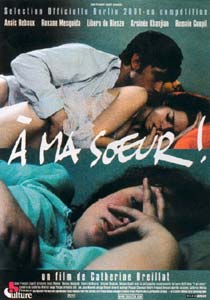- Fat Girl
Infobox Film
name = Jade Elizabeth Short

image_size =
caption =
director =Catherine Breillat
producer = Jean-François Lepetit
writer = Catherine Breillat
narrator =
starring = Anaïs RebouxRoxane Mesquida
Libero de RienzoArsinée Khanjian
music =
cinematography = Yorgos Arvanitis, A.F.C.
editing = Pascale Chavance
distributor =Canal+
released = flagicon|FranceMarch 7 ,2001
runtime = 86 min
country =France
language = French
budget =
preceded_by =
followed_by =
website =
amg_id = 1:239364
imdb_id = 0243255"À ma sœur!" (For my Sister) is a 2001 French film directed by
Catherine Breillat and starringRoxane Mesquida . It was released in some English speaking countries under the alternative titles "For My Sister" or "Fat Girl".Breillat's experience shooting the film inspired her
2002 film "Sex Is Comedy ", which revolves around shooting a sex scene from the film.ynopsis
Thirteen-year-old Anaïs is fat. Her older sister, Elena, is a teenage beauty. While on vacation with their parents, Anaïs tags along with Elena as she explores the dreary seaside town. Elena meets Fernando, an Italian law student, who seduces her with promises of love, and the ever-watchful Anaïs bears witness to the corruption of her sister’s innocence.
Plot
Anaïs (
Anaïs Reboux ) and her older sister, Elena (Roxane Mesquida ) are vacationing with their parents on the French seaside. Bored of staying in their vacation home, the two walk into town while discussing relationships and their virginity. Although Elena has been promiscuous, she is saving herself for someone who loves her, while heavy-set Anaïs thinks it is better to lose one's virginity to a "nobody" just to get it over with. They meet an Italian law student, Fernando (Libero De Rienzo ), at a cafe. While Elena flirts with him, Anaïs orders a banana split. Later, Fernando sneaks into the girls' bedroom for a liaison with Elena. Anaïs is awake and watches their entire interaction. After a conversation about Fernando's previous relationships with other women, Elena consents to have sex with him, but backs out at the last minute. Frustrated, Fernando pressures her through various means, including threatening to sleep with some other woman just to alleviate himself. Finally, Elena consents to anal sex as a "proof of love", although it is obviously a painful experience for her. In the morning, Fernando asks for oral sex from Elena before he leaves, but Anaïs has had enough and tells them to let her sleep in peace. The next day, the girls and Fernando go to the beach. Anaïs sits in the ocean in her new dress and sings to herself while Elena and Fernando go off alone together. Later, as the girls are reminiscing about their childhood together back at the house, Elena reveals that Fernando has given her a mauve opal engagement ring while at the beach. That night, Elena gives up her virginity to Fernando as Anaïs silently cries on the other side of the room. Fernando's mother comes to the house demanding her mauve opal ring back, which her son secretly took from her. Since their father has gone home early, the girls' mother must drive them back to their home outside of Paris. After a long day battling traffic, the three pull into a rest area to catch some sleep. During the night, a man with an axe suddenly breaks in the windshield, swings his axe against the head of Elena in the passenger seat, and strangles the mother in the driver's seat. Anaïs quietly leaves the back seat of the car, but the killer follows her into the nearby woods and rapes her. In the morning, while the police are escorting her from the scene, Anaïs insists that she was not raped and that it was consensual, referring to her earlier intention to lose her virginity to someone who doesn't matter.Controversy
The film was banned in Ontario by the
Ontario Film Review Board in the fall of 2001 because the board objected to the film's representation of teenage sexuality. This ban was eventually overturned and the film played in several theatres in 2003.Awards
In 2001 the film won the Manfred Salzgeber Award at the
Berlin International Film Festival and the France Culture Award at the Cannes festival.External links
*
* [http://www.criterion.com/asp/release.asp?id=259&eid=384§ion=essay Criterion Collection essay by Ginette Vincendeau]
Wikimedia Foundation. 2010.
